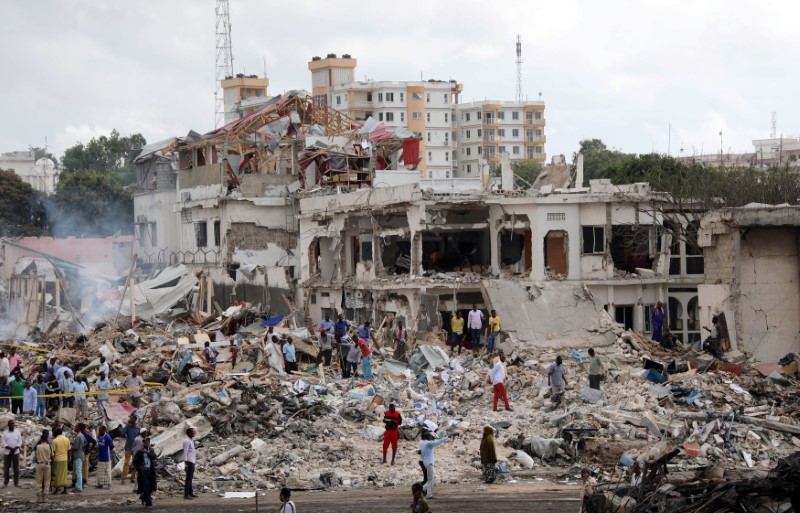
By Abdi Sheikh
MOGADISHU (Reuters) – Two car bombs killed at least 17 people in Somalia’s capital Mogadishu on Saturday, police said, and Islamist group al Shabaab claimed responsibility.
A suicide car bomb was rammed into a hotel, Nasahablod Two, about 600 meters from the presidential palace, and then armed militants stormed the building, police said.
A few minutes later a car bomb exploded near the former parliament house nearby.
Ali Nur, a police officer, told Reuters 17 people, mostly policemen, had died in the blasts.
“Security forces have entered a small portion of the hotel building … the exchange of gunfire is hellish,” he said.
The police personnel who died had been stationed close to hotel’s gate. The dead also included a former lawmaker, he said.
Fighting continued to rage inside the hotel and police said the death toll was likely to rise.
Abdikadir Abdirahman, director of Amin ambulances, told Reuters the emergency service had carried 17 people injured from the hotel blast.
A huge cloud of smoke rose over the scene and a Reuters witness saw over a dozen wrecked cars and bloodstains in front of the hotel. Sporadic gunfire could be heard in the vicinity.
Islamist group al Shabaab, responsible for scores of such attacks in the country’s long civil war, said it carried out Saturday’s bombings.
“We targeted ministers and security officials who were inside the hotel. We are fighting inside,” Abdiasis Abu Musab, the group’s military operations spokesman, told Reuters.
He said the hotel belonged to Somalia’s internal security minister, Mohamed Abukar Islow.
Al Shabaab is fighting to topple Somalia’s internationally-backed government and impose its strict interpretation of Islam’s sharia law.
Bombs in Mogadishu two weeks ago killed at least 358 people, the worst such attacks in the country’s history, igniting nationwide outrage. Al Shabaab was widely suspected, but has not claimed responsibility.
(Additional reporting by Feisal Omar; writing by Elias Biryabarema; editing by Andrew Roche)




